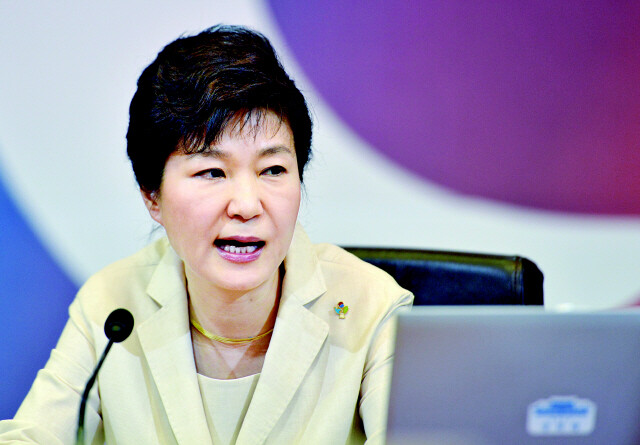hankyoreh
Links to other country sites 다른 나라 사이트 링크
Pres. Park avoids in-person meetings, and that may cause bungled efforts

One of the most frequent criticisms directed at President Park Geun-hye during her term so far has had to do with her avoidance of face-to-face reports. Her preferred method of communicating in writing and by telephone rather than meeting and discussing matters personally has been cited as more than just an idiosyncrasy, but the chief factor in repeated instances of confused government responses.
“Is there any time in the history of administrations when people have been so worried about the President and her communication methods in the Blue House?” wondered Kyung Hee University professor Kim Min-jeon.
Indeed, the same questions have been raised in the cases of the Demilitarized Zone (DMZ) land mine explosion on Aug. 4, the Middle East Respiratory Syndrome (MERS) outbreak in May and June, and even last year’s Sewol ferry sinking, with observers questioning when Park received reports and whether they were delivered in person.
In the case of the mine blast, Park did not exchange a single phone call with supervising Minister of National Defense Han Min-goo in the week between the explosion on Aug. 4 and announcement on Aug. 10. National Security Office chief Kim Kwan-jin did deliver four reports, but all were in writing or by telephone. Some observers have cited Park’s avoidance of in-person reports -- and the resulting inaccurate assessments of the situation - as a factor in the inconsistent and belated response to the explosion, with the National Security Council taking four days to convene.
Awareness of the questions may also have been a factor in Park‘s decision to preside over an immediate NSC meeting after North and South Korea exchanged shell fire on Aug. 20, and to visit military command dressed in combat fatigues the following day.
Park also did not receive any one-on-one report from Minister of Health and Welfare Moon Hyung-pyo during the rapid spread of MERS earlier in 2015. All 21 of the reports she received on the day of the Sewol ferry sinking, which claimed over 300 lives in April 2014, were in writing or by telephone.
“When something is in writing, you can absorb more information in a short period of time,” explained one adviser on Park’s avoidance of in-person reports.
“The issue here is the idea that it’s not ‘communicating’ when the report is written,” the adviser insisted.
But both written and telephone reports also tend to be unidirectional rather than interactive forms of communication.
“President Park doesn’t have her own ‘content.’ It‘s really surprising [in light of her long political experience],” said one figure in the ruling Saenuri Party (NFP) on the reason for her avoidance of in-person reports.
“When you get an in-person report, you have to make decisions then and there, and she can’t do that,” the figure said bluntly.
Korea Academy of Politics director Kim Man-heum noted that in-person reports “characteristically allow you to fix the President’s misunderstandings or mistaken judgments right there.”
“Written and telephone reports are simply unidirectional orders, which is pretty much President Park’s approach to governing in a nutshell,” Kim added.
By Choi Hye-jung and Seo Bo-mi, staff reporters
Please direct questions or comments to [english@hani.co.kr]

Editorial・opinion
![[Guest essay] Maybe Korea’s rapid population decline is an opportunity, not a crisis [Guest essay] Maybe Korea’s rapid population decline is an opportunity, not a crisis](https://flexible.img.hani.co.kr/flexible/normal/500/300/imgdb/original/2024/0430/9417144634983596.jpg) [Guest essay] Maybe Korea’s rapid population decline is an opportunity, not a crisis
[Guest essay] Maybe Korea’s rapid population decline is an opportunity, not a crisis![[Column] Can Yoon steer diplomacy with Russia, China back on track? [Column] Can Yoon steer diplomacy with Russia, China back on track?](https://flexible.img.hani.co.kr/flexible/normal/500/300/imgdb/original/2024/0430/1617144616798244.jpg) [Column] Can Yoon steer diplomacy with Russia, China back on track?
[Column] Can Yoon steer diplomacy with Russia, China back on track?- [Column] Season 2 of special prosecutor probe may be coming to Korea soon
- [Column] Park Geun-hye déjà vu in Yoon Suk-yeol
- [Editorial] New weight of N. Korea’s nuclear threats makes dialogue all the more urgent
- [Guest essay] The real reason Korea’s new right wants to dub Rhee a founding father
- [Column] ‘Choson’: Is it time we start referring to N. Korea in its own terms?
- [Editorial] Japan’s rewriting of history with Korea has gone too far
- [Column] The president’s questionable capacity for dialogue
- [Column] Are chaebol firms just pizza pies for families to divvy up as they please?
Most viewed articles
- 1Dermatology, plastic surgery drove record medical tourism to Korea in 2023
- 2[Guest essay] Maybe Korea’s rapid population decline is an opportunity, not a crisis
- 3First meeting between Yoon, Lee in 2 years ends without compromise or agreement
- 4Under conservative chief, Korea’s TRC brands teenage wartime massacre victims as traitors
- 5Thursday to mark start of resignations by senior doctors amid standoff with government
- 6Months and months of overdue wages are pushing migrant workers in Korea into debt
- 7[Column] Can Yoon steer diplomacy with Russia, China back on track?
- 8AI is catching up with humans at a ‘shocking’ rate
- 9South Korea found the most ramen-eating country
- 1046% of cases of violence against women in Korea perpetrated by intimate partner, study finds